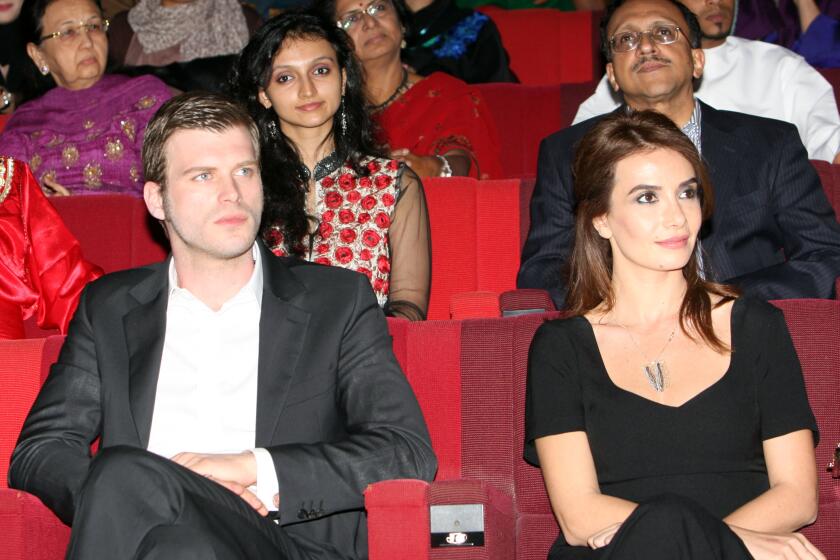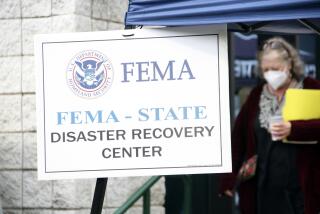Coronavirus becomes a weapon of disinformation in Middle East battle for influence

- Share via
BEIRUT — The coronavirus had struck the emir of Qatar, said one bogus headline. His wife was infected too, claimed another. Authorities in Qatar, one online video indicated, were to blame for allowing “Turks and Iranians to bring corona to its lands.”
Such stories have appeared in wide-scale and well-funded disinformation campaigns in the Middle East, officials, data experts and analysts say, and have remained aggressive during the COVID-19 outbreak. Several have even intensified, leveraging the pandemic to settle scores in the Middle East’s rivalries.
“It’s as if the virus is a mark of shame on countries struggling with the disease. Or there’s an attempt to improve the image of a certain side, crediting them with false capabilities to cure corona,” Omar Fares, an editor at Misbar, an Arab fact-checking platform, said in a phone interview Tuesday.
The campaigns, using networks of bots, accounts on Twitter, Facebook, Instagram as well as a bevy of sites purporting to be local news agencies, have become another weapon in authoritarian governments’ arsenals as they tussle for regional dominance.
The campaigns come as part of a larger wave of inaccurate information — an “infodemic of misinformation and disinformation,” said European Commission spokesman Peter Stano, used “simply for economic profit for companies selling products but also by those who want to undermine … for political reasons.”
The European Union in 2015 had established a project called EUvsDisinfo, meant to counter Russian disinformation targeting Europe. In its monitoring work, Stano said, the group had also encountered coordinated disinformation activity in the Middle East and North Africa (MENA).
It’s Ramadan in Tripoli, and come midnight the streets around the Kabir public garden are a melee of bumper-to-bumper traffic.
“Right from the start, when it began in China, we noticed in the MENA region people trying to misuse the crisis in order to foment Sunni-Shiite animosity, or trump up anti-Iranian sentiment,” Stano said in an interview Monday.
Even Islamic State militants, he said, had latched on to popular coronavirus-related hashtags to spread the group’s messages.
One operation set up to promote Gen. Khalifa Haftar, an aspiring Libyan strongman backed by Saudi Arabia, the United Arab Emirates and Egypt, was detected in December by researchers at the Stanford Internet Observatory.
They alerted Twitter and Facebook and, after an investigation undertaken separately by both companies, the network was dismantled in late March. The takedown involved 5,350 Twitter accounts, 164 Facebook pages, accounts and groups, and 76 Instagram accounts, according to statements released last week by Facebook and Twitter — but not before the campaign had begun to tailor its messaging to incorporate the coronavirus.
The network’s output, which on Twitter included more than 36 million tweets, echoed the stance of an alliance headed by Saudi Arabia, the UAE and Egypt. The three governments have worked since the Arab Spring protests of 2011 to bolster many of the region’s sclerotic but stable governments, while locked in a Cold War-like conflict against Iran and an axis comprising Qatar and Turkey.
Before they were removed, the accounts adapted their output to take advantage of the outbreak that was dominating the news cycle: Turkish President Recep Tayyip Erdogan, they claimed, had dispatched coronavirus-infected fighters to Libya against Haftar, while accusing him of taking advantage of global chaos to further his “illegal Ottoman ambitions.” One video — complete with stern-sounding martial soundtrack — excoriated state-owned Qatar Airways as “the official carrier of the coronavirus;” another claimed that the outbreak had exposed the “brutality of Turkey and Qatar… while showing the humanity” of Saudi Arabia.
In its statement, Twitter said the accounts were “amplifying content praising Saudi leadership, and critical of Qatar and Turkish activity.” It also suspended 2,541 accounts linked to El Fagr, an Egypt-based media group “taking direction from the Egyptian government” to “amplify messaging critical of Iran, Qatar and Turkey.”
Facebook said that, although the “people behind the network attempted to conceal their identities and coordination,” its investigation linked the content to Maat, an Egyptian marketing firm. Maat describes itself as “a comprehensive media services company.”
Other trends in circulating bad information on coronavirus in the region centered on issues of religion, Fares said. One such news item claimed Chinese President Xi Jinping had acknowledged the outbreak as divine punishment for his government’s treatment of Muslims, prompting him to apologize and pray in a mosque. Articles appeared about every Arab country having invented a cure for the virus.
As the COVID-19 crisis continued, its use as a cudgel against opponents evolved.
“The campaigns from the Middle East are becoming more and more sophisticated, which points to the idea that this is not just nonstate actors or accidental manipulators, but also very likely there are state actors behind it,” Stano said.
“And they are sophisticated enough to not leave traces and expose themselves legally. It also has something to do with the state in question: The stronger the state control, the better and more organized the disinformation campaigns are.”
The networks used various tactics to increase engagement.
Television programming is yet another battleground in the Middle East involving Turkey, Saudi Arabia and others.
“It’s not just one campaign; it’s multiple campaigns going on simultaneously, so there’s something every week, or something every day, a continuous push of propaganda or one-sided information to promote,” said a researcher who collaborated with the Stanford Internet Observatory and who spoke on background for safety reasons.
One level involved so-called seeders, who tag people with large numbers of followers on social media so as to get them to jump on a topic. Another group would amplify local media or direct their audience to pages purporting to be local news outlets. Those outlets would engage in hashtag laundering — issuing media content covering artificial social media trends to increase engagement and make them seem legitimate.
Digital content companies also use thousands of bots to boost engagement on a certain topic and create Facebook pages featuring slick minute-long videos pushing a certain line.
In Libya, that line was pro-Haftar, but it was a part of a formula, the researcher said, replicated across the region in support of the Saudi-led axis’ leader of choice.
“Social media is being used against people in these countries. These governments are smarter now. They’re not going to let another 2011 happen,” the researcher said. “Libya is just a side case, but it’s the same all over the region: Push enough content out there to either confuse people by creating hundreds of news sites and stop them from believing the media or push their own version of localized truths.”
More to Read
Sign up for Essential California
The most important California stories and recommendations in your inbox every morning.
You may occasionally receive promotional content from the Los Angeles Times.












